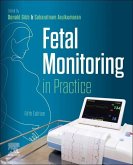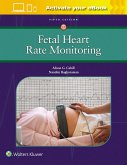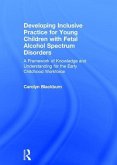Prepared by editors of international renown, the latest edition of Fetal Monitoring in Practice has been fully updated throughout and now presents the latest information in colour! Retaining the features that characterised the success of previous editions - an accessible writing style, basic CTG interpretation, use of correct terminology, common pitfalls associated with equipment usage, underlying pathophysiology, clinical trial data and relevant clinical scenarios - new features include an expanded author team to provide an international perspective, the latest guidelines from NICE and FIGO, new and expanded information on clinical assessment and medical litigation, and a new chapter on competency testing in CTG interpretation prior to practice.
Clear and friendly writing style makes a potentially challenging subject straightforward and accessibleExplains the correct use of terminology to help ensure safe and accurate communicationEmphasizes the importance of using monitoring techniques within the context of detailed clinical assessmentExplains the basics of interpretation including the influence of drugs used for pain reliefExplains common pitfalls associated with equipment usage and provides practical advice on how to avoid themExplains the underlying pathophysiology associated with abnormal changes seen on the CTGExplains and contextualizes relevant clinical trial dataClinical scenarios demonstrate common presentations such as breech birth, twin pregnancies, brow presentation, hypertension, and eclampsiaReal CTG traces demonstrate more complex presentations such as prolonged deceleration, placental abruption, and fetal bleedingPerfect for candidates undertaking the Advanced Training Skills_Module of the RCOGs 'Advanced Labour Ward Practice'
Clear and friendly writing style makes a potentially challenging subject straightforward and accessibleExplains the correct use of terminology to help ensure safe and accurate communicationEmphasizes the importance of using monitoring techniques within the context of detailed clinical assessmentExplains the basics of interpretation including the influence of drugs used for pain reliefExplains common pitfalls associated with equipment usage and provides practical advice on how to avoid themExplains the underlying pathophysiology associated with abnormal changes seen on the CTGExplains and contextualizes relevant clinical trial dataClinical scenarios demonstrate common presentations such as breech birth, twin pregnancies, brow presentation, hypertension, and eclampsiaReal CTG traces demonstrate more complex presentations such as prolonged deceleration, placental abruption, and fetal bleedingPerfect for candidates undertaking the Advanced Training Skills_Module of the RCOGs 'Advanced Labour Ward Practice'
Amazon Review comments of previous edition
"This book is so interesting. I originally purchased it to write an assignment but as I referred to it I would find another interesting bit and get lost in it for another 30 minutes. It will now be my new bible on the delivery suite!
If you are a midwifery student this book is completely worth getting. It is easy to read and explains CTGs in an understandable way. It helps a lot in practice on the acute wards!
This is a must have for all midwives and doctors working in the labour ward environment. It is also an important learning tool for both midwifery and medical students.
This is an excellent book which really helped me with my interpretation of CTGs.
I would highly recommend this book. As a midwifery student I find this book - while detailed - very easy to follow.
"This book is so interesting. I originally purchased it to write an assignment but as I referred to it I would find another interesting bit and get lost in it for another 30 minutes. It will now be my new bible on the delivery suite!
If you are a midwifery student this book is completely worth getting. It is easy to read and explains CTGs in an understandable way. It helps a lot in practice on the acute wards!
This is a must have for all midwives and doctors working in the labour ward environment. It is also an important learning tool for both midwifery and medical students.
This is an excellent book which really helped me with my interpretation of CTGs.
I would highly recommend this book. As a midwifery student I find this book - while detailed - very easy to follow.








